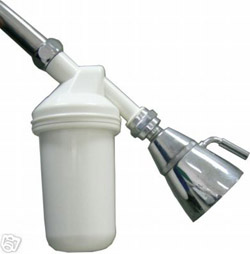Effective shower filters for removing chlorine
 Drinking filtered or bottled water is commonplace these days. Few health-conscious people will drink water straight from the tap if they don’t have to. But even if you avoid contaminated drinking water you could still be tremendously exposed to chlorine and chloramine in the shower. This exposure can be drying and irritating to eyes, skin, and hair. Chlorine also becomes airborne in a shower and is absorbed through the lungs and skin. Long, hot showers lead to the highest amount of exposure and absorption.
Drinking filtered or bottled water is commonplace these days. Few health-conscious people will drink water straight from the tap if they don’t have to. But even if you avoid contaminated drinking water you could still be tremendously exposed to chlorine and chloramine in the shower. This exposure can be drying and irritating to eyes, skin, and hair. Chlorine also becomes airborne in a shower and is absorbed through the lungs and skin. Long, hot showers lead to the highest amount of exposure and absorption.
Many companies are now selling shower filters primarily aimed at removing chlorine and chloramine from your shower water. They vary greatly in price and all make impressive claims about their effectiveness. Unfortunately, shower filters do not have to follow the same government standards that drinking water filters require.
While there is a lot of great information online, it is difficult to find an answer to the simple question, “Which shower filter is the most effective at removing chlorine?” but if you dig around enough, you can find enough independent studies and user reviews to piece together a decent view of the pros and cons of each filter.
There are three types of filtration used in shower filters – activated carbon, KDF (Kinetic Degradation Fluxion) media, and vitamin C.
- Activated carbon filters, which are used in Brita and Pur pitcher filters, work well but only in cold water. They also tend to clog easily especially in more contaminated water.
- KDF media filters remove chlorine but not chloramine. However, these filters also do not function well at lower water pressures and quickly becomes ineffective in very contaminated water.
- Vitamin C filters remove all chlorine and chloramine. Vitamin C filters last a long time and are inexpensive and organic. However, they only remove chlorine and chloramines – nothing else. These filters last around 6 months, which is much longer than other filters.
For our household, getting rid of the chlorine and chloramine was a top priority so we decided on the Vitamin C shower filter. There are two vendors for these types of filters – VitaShower and Sonaki. VitaShower vitamin C filters list for around $40. The Sonaki is a showerhead unit that is available with different types of heads and takes a replaceable vitamin C cartridge. $99 will buy the initial setup and each additional cartridge is around $40.00.
We have been using the VitaShower filter for 3 months now and the difference in our hair and skin are noticeable. It immediately removed the overpowering chlorine smell, which has not returned.
3 Comments Posted by John | Category: Articles

Hiya Food Scout,
I’m making the rounds just in case you didn’t get an email invitation. Our email database is spotty at best.
The Extravablogiversapaloozathon 2008 is September 27th, and we’re hoping every area blogger will come!
Party Info here.
BlogAsheville awards nomination thread here.
RSVP thread here.
Hopefully we’ll get more reviews and testimonials regarding the effectivity of these products. Consumer research must be able pinpoint the most efficient and innovative design. Maybe in the near future, they’ll be at par with the drinking water filters.
I like that these water filters save us money from buying bottled drinking water. There’s only two adults and a kid at home and 5 gallons of water is not enough to last a week. Water expense could cost too much but if we filter it ourselves, we save a lot.